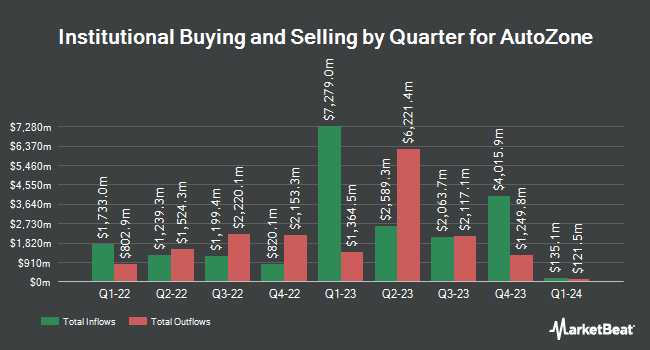Zimmer Partners LP boosted its stake in AutoZone, Inc. (NYSE:AZO - Free Report) by 2.6% in the 1st quarter, according to the company in its most recent 13F filing with the Securities and Exchange Commission. The institutional investor owned 4,000 shares of the company's stock after purchasing an additional 100 shares during the period. Zimmer Partners LP's holdings in AutoZone were worth $15,251,000 at the end of the most recent reporting period.
Other large investors have also recently added to or reduced their stakes in the company. AlphaCore Capital LLC acquired a new stake in AutoZone in the 1st quarter valued at $27,000. Saudi Central Bank acquired a new stake in shares of AutoZone during the first quarter valued at about $27,000. Financial Network Wealth Advisors LLC grew its stake in shares of AutoZone by 66.7% during the first quarter. Financial Network Wealth Advisors LLC now owns 10 shares of the company's stock valued at $38,000 after acquiring an additional 4 shares in the last quarter. Cornerstone Planning Group LLC acquired a new stake in shares of AutoZone during the first quarter valued at about $44,000. Finally, Minot DeBlois Advisors LLC acquired a new stake in shares of AutoZone during the fourth quarter valued at about $45,000. 92.74% of the stock is currently owned by institutional investors and hedge funds.
Analyst Upgrades and Downgrades
Several equities analysts have recently commented on the stock. Bank of America raised shares of AutoZone from a "neutral" rating to a "buy" rating and increased their price target for the stock from $3,900.00 to $4,800.00 in a research report on Wednesday, May 21st. Mizuho increased their price target on shares of AutoZone from $3,740.00 to $4,050.00 and gave the stock an "outperform" rating in a research report on Thursday, July 3rd. Roth Capital set a $4,135.00 price target on shares of AutoZone and gave the stock a "buy" rating in a research report on Monday, June 2nd. Guggenheim increased their price target on shares of AutoZone from $3,850.00 to $4,100.00 and gave the stock a "buy" rating in a research report on Wednesday, May 28th. Finally, Morgan Stanley reaffirmed an "overweight" rating and set a $4,000.00 price target (up previously from $3,750.00) on shares of AutoZone in a research report on Wednesday, May 28th. Three analysts have rated the stock with a Strong Buy rating, eighteen have issued a Buy rating and two have issued a Hold rating to the company's stock. According to MarketBeat, the stock presently has a consensus rating of "Buy" and an average target price of $4,229.38.
Check Out Our Latest Analysis on AutoZone
AutoZone Trading Down 0.6%
NYSE AZO traded down $27.17 during trading hours on Friday, reaching $4,327.37. The company's stock had a trading volume of 100,875 shares, compared to its average volume of 99,795. The business has a 50-day simple moving average of $3,989.84 and a 200 day simple moving average of $3,773.46. AutoZone, Inc. has a 52 week low of $2,898.57 and a 52 week high of $4,388.11. The stock has a market cap of $72.62 billion, a PE ratio of 29.29, a PEG ratio of 2.30 and a beta of 0.41.
Insider Buying and Selling
In other news, VP Richard Craig Smith sold 3,000 shares of AutoZone stock in a transaction that occurred on Thursday, July 24th. The stock was sold at an average price of $3,875.90, for a total transaction of $11,627,700.00. Following the sale, the vice president owned 2,925 shares of the company's stock, valued at approximately $11,337,007.50. The trade was a 50.63% decrease in their ownership of the stock. The transaction was disclosed in a filing with the SEC, which is accessible through the SEC website. Also, SVP K. Michelle Borninkhof sold 750 shares of AutoZone stock in a transaction that occurred on Friday, June 20th. The shares were sold at an average price of $3,597.13, for a total value of $2,697,847.50. Following the sale, the senior vice president directly owned 406 shares in the company, valued at approximately $1,460,434.78. This trade represents a 64.88% decrease in their position. The disclosure for this sale can be found here. Insiders own 2.10% of the company's stock.
AutoZone Profile
(
Free Report)
AutoZone, Inc retails and distributes automotive replacement parts and accessories in the United States, Mexico, and Brazil. The company provides various products for cars, sport utility vehicles, vans, and light trucks, including new and remanufactured automotive hard parts, maintenance items, accessories, and non-automotive products.
Featured Stories

Before you consider AutoZone, you'll want to hear this.
MarketBeat keeps track of Wall Street's top-rated and best performing research analysts and the stocks they recommend to their clients on a daily basis. MarketBeat has identified the five stocks that top analysts are quietly whispering to their clients to buy now before the broader market catches on... and AutoZone wasn't on the list.
While AutoZone currently has a Buy rating among analysts, top-rated analysts believe these five stocks are better buys.
View The Five Stocks Here
Discover the 10 Best High-Yield Dividend Stocks for 2025 and secure reliable income in uncertain markets. Download the report now to identify top dividend payers and avoid common yield traps.
Get This Free Report
Like this article? Share it with a colleague.
Link copied to clipboard.